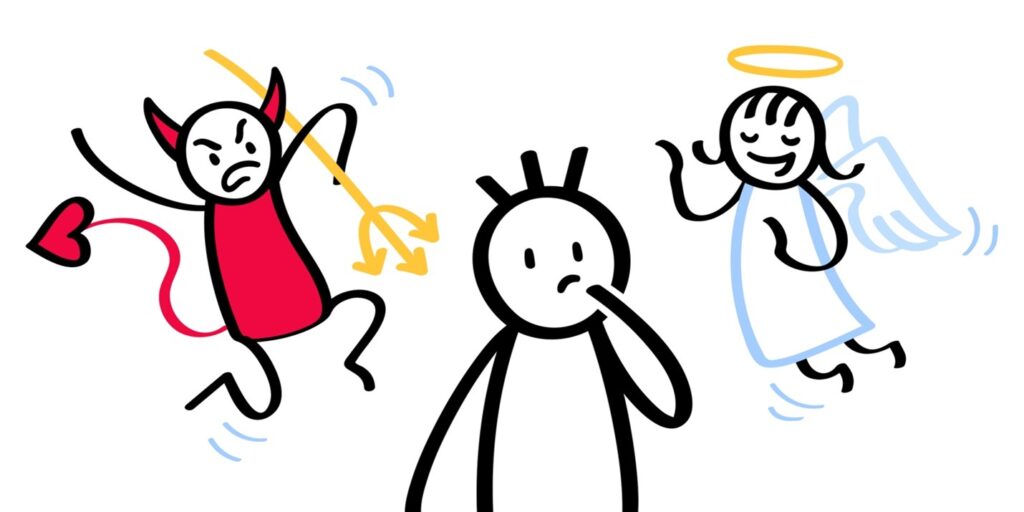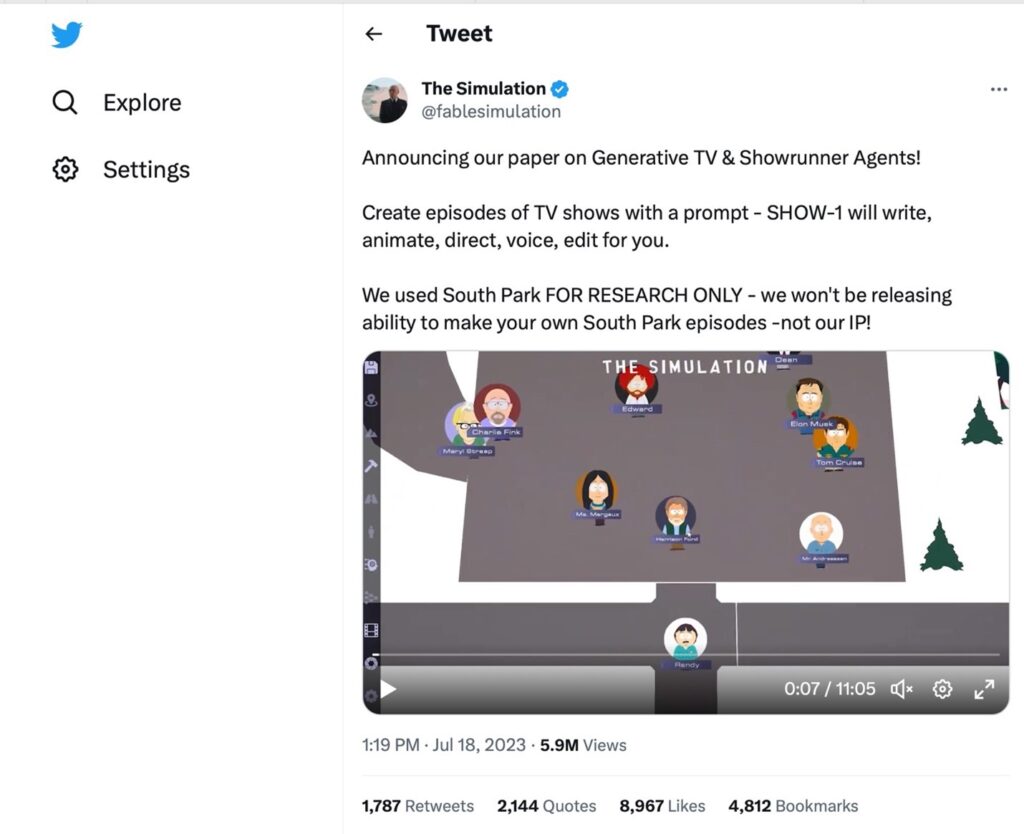Is AI gunning for your Hollywood job? You should be afraid, very afraid. We have seen AI in action as Hollywood writer, director, voice talent… an AI jack-of-all-trades. Is it ready to take Hollywood by storm? Not yet. But, with more on-the-job training, who knows. AI is already invading the entertainment world, and this week, we saw an incredible/frightening demonstration of what is possible and what is to come by a company called The Simulation, and they are not alone in this type of development. Warning: This story was written by a human.
You knew it was coming. So did the Writers Guild of America (WGA). And the Screen Actors Guild too. The “it” is AI, lurking around every virtual corner, waiting to disrupt industries and take over Hollywood-related tasks and jobs. Or is it? Is this just paranoia? Nope. The fear is legitimate.

AI is not new, but it has certainly come into its own and in the public domain and spotlight during the past year. Hollywood has long portrayed AI within a shroud of myth and mystery, and mayhem, which has led us to be wary, and even distrust, the technology. Remember HAL in 2001: A Space Odyssey? And of course, Agent Smith in The Matrix? Just ask ChatGPT, it’ll list other such films that painted AI in a not-so-bright color.
Speaking of which, many a writer has become wary of chatbots like ChatGPT and other forms of AI, to the point where artificial intelligence has becomes one of the dominant issues in the Hollywood writers and actors strikes. So while the picketing continues as SAG-AFTRA and WGA continue to voice their members’ apprehensions about algorithms diminishing and even taking their jobs away (and studios and streaming companies pooh-poohing those concerns), something amazing and terrifying has occurred in a little corner (for now) of the entertainment world. A new generative AI TV and showrunner agent just showed us that indeed, AI is capable of working in Hollywood.
Showrunner is the brainchild of a company called The Simulation, formerly known as Fable Studio, a moniker it first took when it was spun off from Oculus Story Studio in 2018, and whose Wolves in the Walls VR adaptation won a Primetime Emmy for Outstanding Innovation in interactive Media in 2019. And just as so much about AI is unclear, so is information about the company. If you visit Simulation’s website, some of the content is appears more science fiction in nature. However, the company is indeed real, and so is its technology.)
According to the company, its Showrunner generative story system can create new episodes of existing TV shows—by “create,” they mean write, animate, direct, voice, score, and edit them. Skeptical? Don’t be. Simulation has generated a faux South Park episode as proof of those capabilities, all from a single prompt. The company has also made its academic paper “To Infinity and Beyond: SHOW-1 and Showrunner Agents in Multi-Agent Simulations” public and available for download, outlining its processes and concepts. Ironically, AI is up close and personal in the fake South Park episode, titled “Westland Chronicles,” which features the WGA strike and a bogus Hollywood studio that uses AI to entertain children, albeit with disastrous results. In fact, the episode is a cautionary tale presented in an entertaining (but South Park-ish crass) way.
South Park is not behind the faux episode. Rather, Simulation has stated the IP was selected for demonstration purposes only (the episode will not be released commercially) because of the property’s minimalist animation style and the large amount of data available on which to train its custom SHOW-1 model with the various data points.

In a bit of eyebrow-raising information, South Park creators Trey Parker and Matt Stone have their own AI entertainment company start-up called Deep Voodoo. On its website, Michael Blank of Connect Ventures, an investment partner, stated, “Deep Voodoo uses artificial intelligence to support productions in innovative ways that are faster and more cost-effective than traditional VFX technology.”
Deep Voodoo began building its deep fake technology in early 2020. On the other hand, Simulation brought attention to itself this week. Introducing such technology seems foolhardy given the temperature of Hollywood right now, but that seems to be the point behind publishing the South Park episode and paper at this time. At the start of the episode, there is a statement that says: “All AI beings and events in this show—even those based on fictional characters—are entirely simulated. All celebrity voices are generated…poorly.”
In an interview with Forbes, Ed Saatchi, CEO of Simulation, stated the company wanted to share the results of its research in a non-commercial way to show artists and Hollywood producers that the threat of AI is indeed real. That is why Showrunner will not be available to the public, but rather to researchers and journalists only.
However, there is more to this story. Simulation, of course, did not do all this work for no commercial gain, and is creating AI soap operas of sorts, with AI characters who live in AI-created worlds and have AI-generated experiences, and learn and grow accordingly. The company stated it is working with creators and will be announcing several original IP simulations with attached AI TV shows later this year. These include The Prize, a space exploration simulation; Exit Valley, a satire of Silicon Valley simulation; and Charlie Jupiter, a detective simulation.
“Our goal at The Simulation is AGI—AIs that are truly alive, not chatbots that pop into existence when we speak, but AI people living real daily lives in simulations, growing over time,” stated The Simulation in a tweet. “We built showrunner agents and are building [the] SHOW-1 model to give our AIs infinite stories.”
What do we think?
AI can be used for good, and it can be used for less noble reasons. As the technology proliferates, this duality will no doubt continue, as it is human (and, by extension, AI) nature.
So, where could Showrunner lead? It could be used to generate fan-based content—although unlike mods in gaming, studios are protective of their IP (ironically, that is what actors are, in essence, trying to do in their contract demands with their own IP, their likeness). This AI can also be used with original IP—generative TV, if you will. Of course, it could be used to undermine writers and talent in an effort to create shows on the cheap.
Fran Drescher, president of SAG-AFTRA, has stated, “Artificial intelligence poses an existential threat to creative professions, and all actors and performers deserve contract language that protects them from having their identity and talent exploited without consent and pay.” I don’t know about you, but this is not far-fetched considering AI’s current and growing capabilities.
While the humans are on strike, the AI developers of apps and tools are not, and you can bet they are working hard on virtual alternatives to pitch—options that will and are waiting in the wings for their turn in the spotlight. After all, how long will reruns and offerings produced abroad satiate Americans’ hunger for new entertainment?
Some facilities, though, are maintaining their ground. Recently, Valve said it would not publish games that have AI assets that infringed on copyrighted material, whether that is art or other content. That does not mean that developers cannot use AI technology; they just have to do so with “appropriate commercial licenses and cannot infringe on existing copyrights,” the company stated.
Indeed, the entertainment industry is trying to get ahead of the AI situation. Remember the uproar in the music industry when an AI-made Drake and The Weekend song was pulled from streaming platforms due to an outcry over copyright violations. And, Sarah Silverman is battling OpenAI and Meta, claiming their AI models were trained on her work without her permission.
Generative AI, love it, hate it, or live with it. It is here to stay.